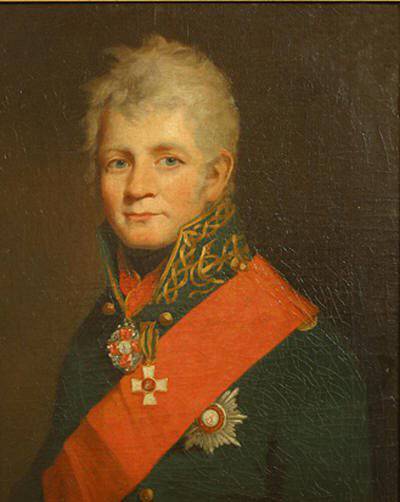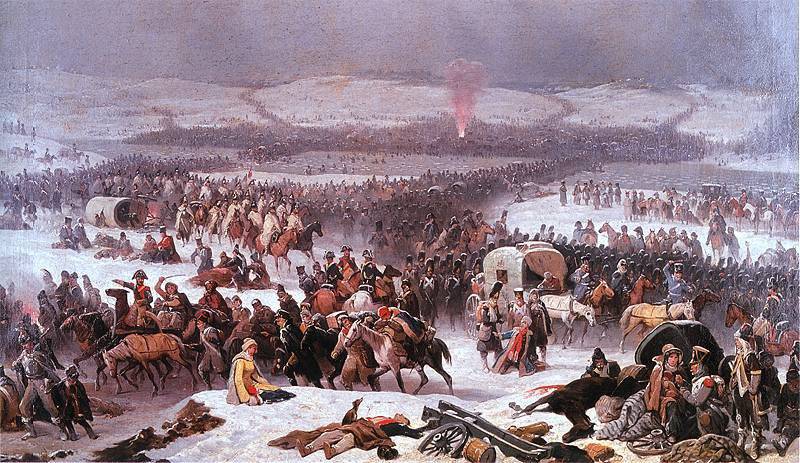A true patriot of the Fatherland. Admiral Pavel Vasilyevich Chichagov
 Public opinion does not accept difficult circumstances, as it does not accept failures on the battlefield, no matter how strong the opponent is. It absorbs well only the simple truth of victories.
Public opinion does not accept difficult circumstances, as it does not accept failures on the battlefield, no matter how strong the opponent is. It absorbs well only the simple truth of victories.Pavel Vasilyevich Chichagov is a talented naval commander, a naval minister of the Russian Empire and a not very successful commander who was entirely responsible for the failure of the court community at Berezina. In fact, public opinion put an end to the career of Pavel Vasilyevich after 1812, which hardly benefited state affairs.
Pavel Vasilyevich Chichagov was born on July 8 1767, in the family of naval officer Vasily Chichagov. Soon, the family moved to Kronstadt - at the place of service of his father, and 1776 returned to St. Petersburg, where Pavel Vasilyevich was educated at the German School of St. Peter.
In 1779, Chichagov was enlisted in the military service by a sergeant of the Life Guards Preobrazhensky Regiment. January 1782, was marked by the first sea voyage of Pavel Vasilyevich. He was assigned to the 1 Marine Battalion, adjutant to his father, then Vice-Admiral, and under his command went from Kronstadt to Livorno and back.
In 1783 Pavel Chichagov promoted to lieutenant fleet, and after 4 years he received the rank of senior officer on the ship "Ezekiel", which as part of the detachment under the command of Admiral T.G. Kozlyaninova participates in a raid on the island of Bornholm. After, receives an appointment to his father in St. Petersburg.
The Russian-Swedish war in 1788-1789 of the year required the return of talented officers to the fleet.
In April, 1789 Pavel Vasilyevich was promoted to captain of the 2 rank and received the flagship battleship Rostislav in submission.
In this rank he visited the battles near the island of Åland in July 1789, and in the spring-summer of the next year at Vyborg and Revel. Under Revel, the battleship Chichagov was in the center of the battle line and took the brunt of the Swedish squadron. For this fight, Pavel Vasilyevich was awarded the Order of St.. George IV degree. In the battle of Vyborg, Chichagov also proved to be an excellent commander, for which he was promoted to captain of the 1 rank by the Empress Catherine II herself, he also received a golden sword with the inscription "For Bravery".
After the end of the war, Chichagov Jr., for 8 years of service, having assessed the depth of the problems of the Russian fleet, asked the permission of his father to raise his education abroad. The latter redirects the request to the empress and she gives her consent. Peter and Pavel Chichagov, under the guidance of the famous mathematician Guryev, are sent to England. There, thanks to the Russian envoy in London, Semyon Romanovich Vorontsov, they enter the English maritime school and are intensively engaged in the English language and ship sciences. After a while, Chichagov even tried with an English ship to get into the New World, but for some reason the ship returned to Albion.
Having stayed in England for about a year and enriched with knowledge of shipbuilding and the modern organization of the fleet of the most powerful maritime power of the world, Pavel Vasilyevich returned to Russia. In 1793, he was assigned to the captured vessel, Sophia-Magdalena, transferred to 1794 by the commander of the vessel Retvizan, which in the squadron of Vice-Admiral Khanykov runs along the coast of England. During this campaign, met with the family of his future wife - Elizabeth.
In 1796, Pavel Chichagov was promoted to captain of a brigadier rank. In the same year, Emperor Pavel I came to power, and for Chichagov, who had time to wit and disregard secular chatterboxes, to make many enemies for himself, difficult times would come.
In 1797, Chichagov was dismissed; later, not satisfied with this, Pavel I refused Chichagov to go to England to get a bride. Then, on the slander of Count Kushelev in 1799, the emperor deprives Chichagov of the Cross of St. George and sends him to the Peter and Paul Fortress, however, thanks to the intervention of the Governor-General Count von der Palen, the monarch changes his decision and returns Chichagov to the service, allowing him to marry Elizabeth. Soon, Pavel Vasilyevich in the rank of Rear Admiral commanded an expedition to the Texel wreck. For success in the landing receives the Order of St.. Anna 1 degree.
The reformist spirit "seized" Russia with the accession of Alexander I did not allow Chichagov to get lost. In 1802, Pavel Vasilyevich takes an active part in the work of the committees of the Marine Ministry, and 1807 receives the post of minister and the rank of admiral. Rapid career growth reinforced the already unfriendly attitude of courtiers. In this position, according to contemporaries, he did a great job of reorganizing the management of the fleet and port cities. The system created by Chichagov with minor changes will work until the twentieth century.
In the 1809 year, due to constant conflicts with other ministers and officials within the ministry, Chichagov takes overseas leave and the ministry is no longer in charge of the ministry from this moment on. Officially, he was relieved of his post only in 1811 year.
Even before Napoleon Neman’s transition, Alexander I sent Chichagov in command of the Danube Army, the Black Sea Fleet, and at the same time appointed him to the post of Governor-General of Moldavia and Wallachia. The emperor of Russia was not pleased with Kutuzov’s slowness and had his own plan. Chichagov arrived in Iasi on May 11, but the slow-moving Kutuzov had already made peace with Porto by that time, the plan of the emperor remained a plan. The new commander-in-chief had nothing to do on the banks of the Danube.
The case was with the beginning of the Patriotic War, when it became clear that the forces of the 3 Army under the command of Tormasov would not be enough to smash or force the combined forces of the battered Rainier corps and the Austrians of Schwarzenberg to retreat. The corps of Tormasov joined the Danube army in the town of Lutsk, bringing the total number of Russian troops in the south to 60 thousand. The command of the combined forces passed to Chichagov. After a series of maneuvers, Schwarzenberg retreated beyond the borders of the Russian Empire, and Chichagov’s troops freed up to act against the main forces of Napoleon, who were already retreating along the old Smolensk road.
According to the original plan, the 160 of thousands of Russian troops were to assemble at Berezina: the Chichagov army from the south, the Wittgenstein corps from the north and the main forces of Kutuzov pursuing the French. Chichagov was entrusted with the task of occupying the city of Borisov and creating a fortified camp on the side of the river Beaver. In fact, it turned out to be extremely difficult to fulfill these instructions, not only because of lack of experience — Chichagov never commanded the land army, but also because of the departure of experienced and talented tactical commanders (Lambert, for example). Langeron, who replaced him, did not conduct any tolerable reconnaissance. Posted by Palen, he was ambushed by the French and, having lost 600, the man retreated, leaving a wagon train. The court intriguers inflated this figure to 2000, in this form the data came from Petersburg.

As a result, coming to Berezina, Napoleon had a number of 45 thousand with 250 guns against 20-24 thousand with 36 guns from Russians, who were stretched between the Berezina river and the village of Veseloe.
In addition, at the critical moment Chichagov was not supported by General Wittgenstein, which ultimately played a decisive role. The question of the reasons for the delay of Wittgenstein, who was very resolute in the battles in the north direction, won several brilliant victories over Oudinot, Saint-Cyr and Victor, remains unanswered.
On the other hand, the obvious strategic miscalculations of Chichagov himself, among which, as Kutuzov noted, were: the wrong choice of tactical position, insufficient reconnaissance of the area, poor attention to guard duty and lack of initiative, manifested in the formal observance of the orders of the commander in chief, despite changing environment.
Be that as it may, success under Berezina cost Napoleon a great deal: 56 thousands killed, including 21 thousands of combat-ready soldiers, against 6 thousands of losses among the Russians.
But the court community was not interested in such details. Neither was they interested in the fact that it was Chichagov who quickly seized Minsk by swift march-throwing - an important stronghold of the French, the loss of which forced Napoleon to decide to cross the river to 10 in degree frost.
Acknowledging his mistakes, Pavel Vasilievich surrenders command to Barclay de Tolly as soon as possible.
In 1814, Chichagov leaves for exile, from which he will not return, even at the invitation of Nicholas I in 1834. The end of Napoleon's warrior did not lead to the beginning of reforms, Alexander I felt the taste of absolute power and brought one of the most prominent conservatives closer to himself, General Arakcheev, scoring the last nail in the coffin of hopes for reform.
The rest of his life, Pavel Vasilyevich will live in Italy and France, mainly in the town of Co, which is not far from Paris.
Pavel Vasilyevich died on August 20 1849 of the year, sending his letters of Alexander I and all his awards to Emperor Nicholas before his death.
Information